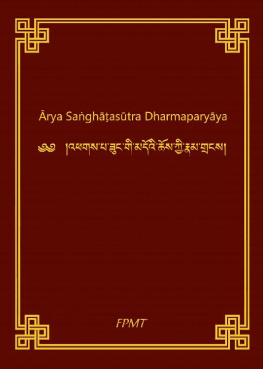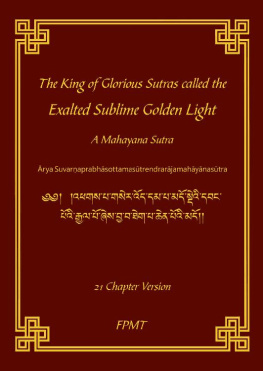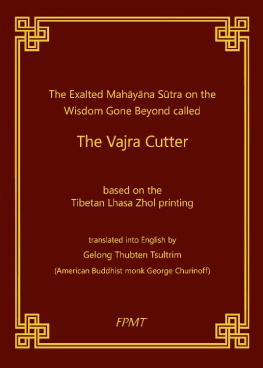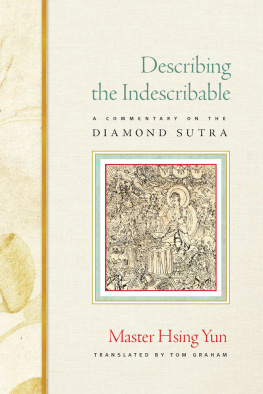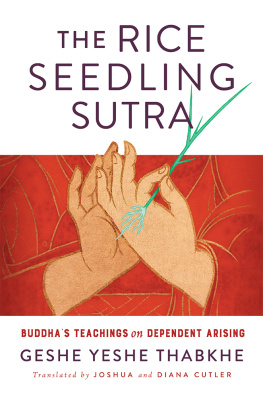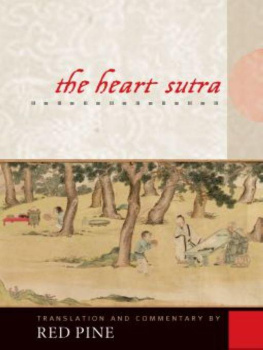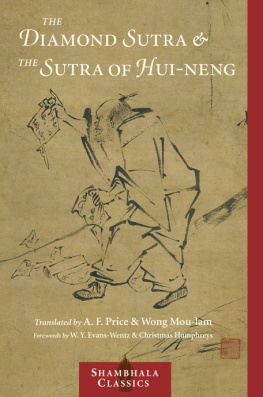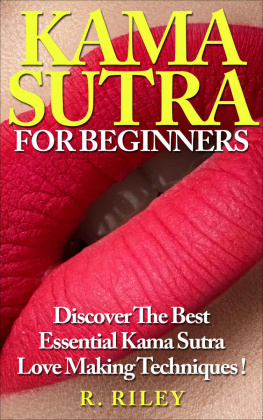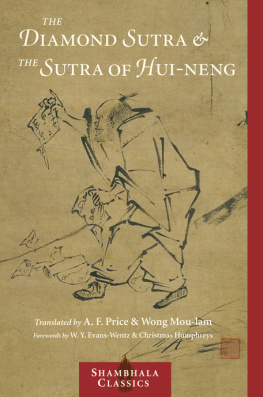FPMT, Inc.
1632 SE 11th Avenue
Portland, OR 97214 USA
www.fpmt.org
2001 FPMT, Inc.
All rights reserved.
No part of this book may be reproduced in any form or by any means, electronic or mechanical, including photocopying, recording, or by any information storage and retrieval system or technologies now known or developed, without permission in writing from the publisher.
Note to the Reader
The Noble Sanghta Sutra that follows was translated into English from the Tibetan edition of this Mahayana discourse by the Buddha. Please note that in this translation, the indented parts appear as verses in the original Sanskrit and Tibetan. Please read them with the understanding that these are all the four-line verses to which the sutra refers many times.
For ease in pronouncing longer Sanskrit names, an accent mark appears on the syllable that should be stressed and words have been broken up with hyphens. This translation follows the Clay Sanskrit Library (CSL) conventions for presenting Sanskrit in English texts. For further guidance in pronouncing the Sanskrit names, as well as a list of the meanings of those names, please see www.sanghatasutra.net.
have been included.
A version of this translation with explanatory footnotes is available at www.sanghatasutra.net/translations_english.html.
For more information about the Sanghta Sutra, visit www.sanghatasutra.net. This site provides a fuller guide to reading and reciting the sutra, accounts of others' experiences with this text, a discussion forum about the Sanghta, and much more.
The Noble Mahayana
Sanghta Sutra Dharma-paryya
In the language of India: Arya Sanghatasutra Dharmaparyaya
In the language of Tibet: phag pa zung gi do'i ch kyi nam drang
Homage to all the buddhas and bodhisattvas!
Thus I have heard at one time. The Blessed One was dwelling in Raja-griha, on Vulture's Peak, together with a great assembly of 32,000 monks, including the venerable Ajnta-kaundnya, the venerable Maha-maudgalyyana, the venerable Shari-ptra, the venerable Maha-kshyapa, the venerable Rhula, the venerable Bkkula, the venerable Bhadra-pla, the venerable Bhdra-shri, the venerable Chndana-shri, the venerable Jangla, the venerable Subhti, the venerable Rvata, the venerable Nanda-sna and so forth; and together with 62,000 bodhisattvas, including the bodhisattva, the great being Maitrya, the bodhisattva, the great being Sarva-shra, the bodhisattva, the great being Kumra-shri, the bodhisattva, the great being Kumra-vsin, the bodhisattva, the great being Kumra-bhdra, the bodhisattva, the great being Anna, the bodhisattva, the great being Manjshri, the bodhisattva, the great being Samanta-bhdra, the bodhisattva, the great being Sudrshana, the bodhisattva, the great being Bhaishajya-sna, the bodhisattva, the great being Vajrasna and so forth; and together with 12,000 deva sons, including the deva son rjuna, the deva son Bhdra, the deva son Subhdra, the deva son Dharma-ruci, the deva son Chndana-grbha, the deva son Chndana-vsin, the deva son Chndana and so forth; and together with 8,000 deva daughters, including the deva daughter Mirdmgini, the deva daughter Prasdavati, the deva daughter Mahtma-sampraykta, the deva daughter called 'Glorious Eye,' the deva daughter Prajpati-vsini, the deva daughter Blini, the deva daughter called 'Glorious Wealth,' the deva daughter Subhu-ykta and so forth; and together with 8,000 naga kings, including the naga king Apalla, the naga king Elaptra, the naga king Timngila, the naga king Kumbhasra, the naga king Kumbha-shrsha, the naga king called 'Causing Virtue', the naga king Sunnda, the naga king Sushkha, the naga king Gava-shrsha and so forth.
All of them proceeded to Raja-griha, to Vulture's Peak where the Blessed One was. When they reached there, they prostrated with their heads at the feet of the Blessed One, circumambulated the Blessed One three times, and then they all sat down in front of the Blessed One. The Blessed One assented to their presence by remaining silent.
Then the bodhisattva, the great being Sarva-shra arose, placed his upper robe over one shoulder, set his right knee on the ground, placed his palms together and bowed down to the Blessed One. He addressed the Blessed One as follows: "Blessed One, a million devas, a million daughters of devas and many millions of bodhisattvas have gathered. Blessed One, many millions of shrvakas and also naga kings have gathered and are seated to hear the Dharma. That being so, may the Tathgata, the Arhat, the Perfect and Complete Buddha please teach that sort of approach into the ways of Dharma through which, as soon as they hear it, old sentient beings will purify all their karmic obstacles, and young sentient beings will make great effort at virtuous Dharma and will attain special superiority, and their virtuous actions will not degenerate, will not at all degenerate and will not become at all degenerated."
He said this, and the Blessed One spoke thus to the bodhisattva, the great being Sarva-shra: "Sarva-shra, that you thought to ask the Tathgata about this point is good, very good. Therefore, Sarva-shra, listen well and attentively, and keep it in mind, and I will tell you."
Having said to the Blessed One, "Just so," the bodhisattva, the great being Sarva-shra listened with full attention to the Blessed One.
The Blessed One spoke thus to him: "Sarva-shra, there is a dharmaparyya called Sanghta that even now is still active on this planet earth. Whoever hears this Sanghta dharma-paryya will have their five uninterrupted karmas purified, and they will never turn away from unsurpassed, perfect and complete enlightenment. Sarva-shra, what do you think about this? If you think that those who hear this Sanghta sutra will produce as much as the mass of merit of one tathgata, you should not see it like that."
Sarva-shra said, "Well then, how should it be seen?"
The Blessed One said: "Sarva-shra, those bodhisattvas, great beings will also produce as much a mass of merit as the masses of merit of as many tathgatas, arhats, perfect and complete buddhas as grains of sand in the Ganges river. Sarva-shra, those who hear this Sanghta dharma-paryya will never turn away. They will see the Tathgata. They will never be separated from seeing the Tathgata. They will be completely enlightened in the unsurpassed, perfect and complete enlightenment. The virtuous dharmas that they will all achieve will not be overpowered by the wicked Mara. Sarva-shra, all those who hear this Sanghta sutra will understand arising and cessation."
Then, at that moment, all of those bodhisattvas arose, placed their upper robe over one shoulder, set their right knee on the ground, and asked of the Blessed One, "Blessed One, how much is the mass of merit of one tathgata?"
The Blessed One spoke as follows: "Children of the lineage, listen to the measure of the mass of merit of one buddha. It is as follows: To make an analogy, as great as is the mass of merit of as many bodhisattvas abiding on the ten levels as there are drops of water in the great ocean, and particles of dust on the planet earth, and grains of sand in the Ganges river - the mass of merit of one buddha is much greater than that. As for those sentient beings who hear this Sanghta dharma-paryya, the mass of merit they will produce is much greater even than that. It is not possible to realize the limit of that mass of merit by counting. Sarva-shra, anyone who feels great joy at the time, at the moment when they hear these words will produce an immeasurable mass of merit."
Then the bodhisattva, the great being Sarva-shra said to the Blessed One, "Blessed One, who are those sentient beings who thirst tremendously for the Dharma?"
After he said this, the Blessed One spoke as follows to the bodhisattva, the great being Sarva-shra: "Sarva-shra, there are two sentient beings who thirst tremendously for the Dharma. If you wonder which those two are, Sarva-shra, they are as follows: One has an equal mind toward all sentient beings. The second, Sarva-shra, is anyone who after hearing the Dharma reveals it correctly and fully to all sentient beings equally."
Next page
